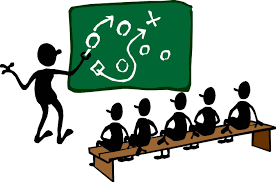Much More than Memorizing
This blog focuses on 2nd, 3rd and 4th grades.
 Like solving a math problem, each time the actor plays a new character, he or she must do a process of steps to bring the character to life.
Like solving a math problem, each time the actor plays a new character, he or she must do a process of steps to bring the character to life.
It’s more than memorizing lines… The actor may hear – “Become the character.” BUT, what does “become the character really mean.” If you break that statement down, you will see that there are actual steps the actor performs before the final product is presented. Memorization is just one step in the process and it is not necessarily first. We are working on creating a character, learning how to enter and move on stage, learning how to speak on stage and learning when to speak. The students are often adept at memorizing, but it’s just as important to know when to speak. We call it “listening for your cue.” A cue gives you a sign when it will be your turn to say your line. It could be visual or audible – it could be a specific word, line or understanding the content. Learning to listen for one’s cue, keeps the actor focused and engaged in the action of the story. In our classroom, we will even practice this various warm-ups.
4th grade – LiONS AND GECKOS are preparing for their Monologues, which they will present in February. The focus of their work right now is creating a character that is authentic and believable. They look for any information about their character that is given in their monologue, and answer questions that build a life for their character. If the information isn’t there, the students must imagine and create what would be “true” about their character. They must create imaginary circumstances that are exciting and fun for themselves and for their audience. They answer simple questions from “What’s your name?” to questions like –”My favorite thing to do is… I get angry when… What do I fear most… Why am I saying these words?” The students will also participate in Character Interviews which help prepare them to connect to their character prior to presenting their memorized monologues. Currently, they are working on the MOMENT BEFORE. This is a concept that helps the actor enter the stage “in character” already in action, emotionally alive and connected. Where is the character coming from? What just happened? How does he/she feel?
Below is the Monologue Rubric which is how the 4th and 3rd grade students will be graded on their work.
3rd grade – TREEFROGS AND LLAMAS are also preparing for Monologues. A monologue is a speech delivered by one person. The Greek root word monologos translates to “speaking alone” – one person doing all the talking. A character might have an internal monologue where one talks to oneself to better understand some dilemma or in conversation, a character may speak extensively to another character to convince, to belittle, to persuade, to comfort (just a few examples) another character. Like the 4th graders, the 3rd grade classes are creating a life for their character, and we will be holding character interviews in class. The goal is for the student to stay in character the entire exercise – acting “as if” he/she was that person. Perhaps the best way to define STAYING IN CHARACTER is by describing when the actor “breaks” character. Breaking character occurs when the actor ceases to maintain the illusion of the character they are portraying.
3RD AND 4TH GRADE monologues have been sent home in hard copy and also electronically. Please encourage your child to work on memorization and creating an authentic and believable character. Acting a monologue is more than memorization – standing on stage and giving a speech. It is the actor’s job to fill in the thoughts, feelings and actions of the character so that the words become his/her own.
2nd grade – TIGERS are in rehearsal for their play, along with the Kindergartners and 1st grade, called BUGGED. It will take place on Wednesday, March 13th in the morning. We have begun the blocking process and some character work. Blocking is the process of planning how and where the actors will move around the stage. The stage is divided up into sections – based on the actors’ perspective to the audience. So to cross Upstage the actor moves away from the audience. To move Downstage one is moving toward the audience. To move Stage Left or Stage right is to cross from the actor’s left/right. A Cross is the way an actor moves on stage. The Wings are part of the stage but offstage, out of sight of the audience. The wing space is used for performers preparing to enter. Cue/Cue line is a prearranged sign or a line that indicates it’s time to say the next line or action. Actors listen for cues in the text so that they know when it’s time to say or do something. On-book means using the script because the actor is early in the process of memorization. The students are moving towards being Off-book, fully memorized.
2nd grade students need to be memorized by February 20.
Grasshoppers Ants
 Come this Thursday to THE ODYSSEY at Quest.
Come this Thursday to THE ODYSSEY at Quest.
A time for information and inspiration! Join us on February 7 from 6:00-8:00pm
































 Can you imagine a snow boarder trying to qualify for the Olympics having only trained for a year? Absurd! Can you even conceive of an eye surgeon to be an expert in his field, but having never actually
Can you imagine a snow boarder trying to qualify for the Olympics having only trained for a year? Absurd! Can you even conceive of an eye surgeon to be an expert in his field, but having never actually 



 Our second grade class is a bigger class and is still learning how to work together – listening, sharing ideas and thought then executing. They really enjoyed reading through the play Everyman and are still curious about how it ends. They read with interest and great expression. Transferring that enthusiasm into personal work is always tricky for the actor. Moving from reading words on a page to bringing it life is a process. Keep in mind when you watch, these 2nd graders created the story and action themselves.
Our second grade class is a bigger class and is still learning how to work together – listening, sharing ideas and thought then executing. They really enjoyed reading through the play Everyman and are still curious about how it ends. They read with interest and great expression. Transferring that enthusiasm into personal work is always tricky for the actor. Moving from reading words on a page to bringing it life is a process. Keep in mind when you watch, these 2nd graders created the story and action themselves.





























